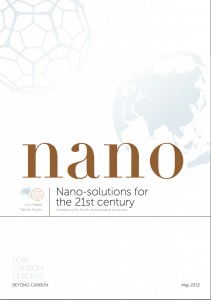Dec 23 2013
A recently released technology report titled Nano-solutions for the 21st century outlines nanotech-based solutions to global challenges. Several years in the making, the report was co-authored by Dennis Pamlin, Research Fellow at the Chinese Academy of Social Sciences Research Center for Sustainable Development (RCSD web site currently in Chinese only), and Eric Drexler, Academic Visitor with the Oxford Martin School’s Programme on the Impacts of Future Technology and author of Radical Abundance. The report has a strongly international perspective, and the Abstract is presented in both English and Chinese.

The core technological emphasis of the report is atomically precise manufacturing, and even those most familiar with the topic will find the breadth of this report compelling and informative. The report discusses — in reader-friendly presentations – a number of broader issues, such as:
- shifts in thinking about the roles of new technologies (from creating specific technological capabilities to creating enabling technologies intended to support further technological advancements),
- the surprising value of atomically imprecise technologies,
- the leverage gained by applying defined criteria and metrics to the evaluation of research results and progress,
- how funding and policy shape incentives and carry unintended consequences (some desirable, some not), and
- simple actions that can be taken today to effect positive change.
A number of concrete examples are presented to illustrate concepts and conclusions.
Perhaps most importantly, the report emphasizes the need for international discussion. Excerpts from the report’s Abstract read:
The world faces unprecedented global challenges related to depleting natural resources, pollution, climate change, clean water, and poverty. These problems are directly linked to the physical characteristics of our current technology base for producing energy and material products. Deep and pervasive changes in this technology base can address these global problems at their most fundamental, physical level, by changing both the products and the means of production used by 21st century civilization
[T]he report as a whole describes low-cost actions that can help solve critical problems, create opportunities, reduce security risks, and help countries join and accelerate cooperative development of this global technological revolution. Of particular importance, several considerations are highlighted that strongly favor a policy of transparent, international, collaborative development.
Within the theme of global conversation and collaboration, I found especially pertinent the discussion of technology roadmapping. Distinct from general conferences, in which information can be shared passively, technology roadmapping hinges on real-time collaboration. Analogous perhaps to the anticipated transition into ‘smart objects’ (that is, objects able to self-adjust in response to surroundings), a transition into ‘smart conferences’ (structured specifically to produce consensus output which then guides the continued advancement of technology) may become a hallmark indicator of a new, advanced technology era.
-Posted by Stephanie C